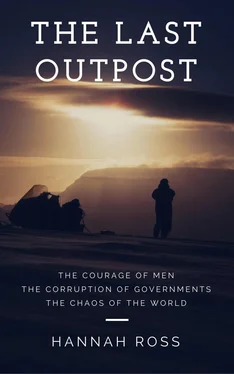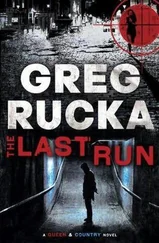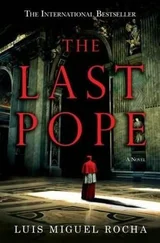The rest of the party evidently appeared to think the same way. Leaving their boats and equipment neatly packed and sheltered behind some rocks, they began slowly creeping towards the pack. It was obvious they had hunted together many times, for their moves appeared pre-arranged, but hardly a word was exchanged. Stepping soundlessly, they got nearer to the pack from three sides. The vigorous wind blowing from the sea prevented the seals from smelling the danger. Scott, aware of his clumsiness compared to the Anai hunters, stayed close on Ri Omrek’s heels, clutching his harpoon with nervous force. He felt his palms begin to sweat inside the fur-lined gloves that were tied to his parka by leather strings. He was afraid he would make a noise and ruin the hunt for everyone, but his moccasins allowed him to move quietly and efficiently, nearly as much as the Anai people.
Finally, one of the older male seals, fat and mighty and with deep battle scars on his neck, appeared to sense danger, and made a loud, warning cry which caused the pack to stir. The animals began to move towards the ice slide, desperate to get into the water where their speed and agility would make them nearly impossible to reach. It was too late for a small group of seals on the fringes of the pack, however — they were cut off and surrounded by the hunters, and the desperate frightened cries of the animals were nearly human. Scott, anxious not to make himself look like a ninny in the eyes of these nature-chiseled men, advanced with his harpoon, though he hardly knew what to do with it, but was shoved aside by Ne Tarveg — not, it seemed, without certain satisfaction on part of the latter. With one mighty strike, he crushed the skull of the nearest seal, and the animal fell upon the rocks limp and lifeless. The rest of the animals were promptly dispatched as well, and their last cries were like pleas for help to their brethren, who were far and safe in the water.
Scott looked upon the scene of carnage, and his heart was heavy and somber. Rationally, he knew that the seals were plentiful, and that whatever slight reduction in their population over the recent decades was to be attributed to the pollution and climate change prompted by modern humans, not to the sustainable and sparse harvest of the Anai which had gone on for thousands of years, leaving the colonies as vigorous as before. He also knew that the Anai depended on the seals, and that the animals would be taken to the village in their entirety, to use up ever bit — meat, skin, blubber and bone, not leaving anything to waste. But still, something in him shied away from the slaughter, and he suddenly wished he had his synthetic outer gear back on.
None of the Anai appeared to share his sentiments. They inspected their kill with exclamations of delight, and several already knelt by the carcasses and began the laborious process of skinning. Ri Omrek came over to him, flushed with excitement. “Good, very good hunt,” he said. “You see that one? Big male?” and he pointed below, where the pack of seals found another shelf of rock and huddled together, still looking around nervously. The old male with the scarred neck was more alert than all the rest, issuing calls that appeared to be prompting the others to be on their guard. “I see him since my first hunt, every year,” he went on. “He lead the pack, while the seals breed, as long as I remember. Never caught, never lets hunter get close. He the elder of the pack. I wish me like him,” Ri Omrek concluded with a grin, respectfully glancing down at the enormous male.
This attitude of respect, almost of reverence, served to reconcile Scott somewhat to the brutality of the hunt. The Anai, after all, did not wear skins and furs as a fashion statement or a status symbol. Without seals, they would have nothing to put on their backs, and they appreciated this animal, which gave them warmth and life. As he stood, he heard one of the elders begin a chant, slow and mystical, and a quick, low explanation by Ri Omrek let him understand that this was a song of praise for the Spirits of the Sea, who had given the Anai this gift of clothing and food to sustain them throughout the long harsh winter.
“It looks like the boats had been brought for nothing,” Scott observed, but Ri Omrek shook his head.
“We here, and the boats here, so might go out to sea for some fishing. You want to go?”
Each boat held about five men, so while half of the party went out to sea, the others were left behind to skin and butcher the seals. To his unease, Scott found himself beside Ne Tarveg again, climbing into a rickety little vessel he wouldn’t normally trust with his life even in a swimming pool.
The Anai boats were little canoes of ingenious make. Their carcass was whalebone, with the body made of sturdy, waterproof sealskins cured in a special way for this purpose. The paddles, too, were made of whalebone, with the sealskins stretched across their bottoms in the shape of flippers. Scarcity of wood made the Anai use it very sparingly, with bone and stone being the core of their buildings and utensils.
The boats were light and easy to maneuver, but their flimsiness made Scott wonder once more at the origins of the Anai. If this was the peak of their seamanship, how could they have ventured from New Zealand, or from any other land, to the frozen seas of Antarctica?
For a while, it seemed the boat wandered aimlessly, with no fish in sight, but then someone shouted, “Mulluvik!” and Scott saw, at a short distance, the back of something large and grey. It took him a few seconds to determine that the something was probably a minke whale. Small as this kind of whale was, he still questioned the wisdom of attempting to take it on with two boats that hardly came up to its overall length. He had no desire to reenact The Old Man and the Sea near the shores of Antarctica, but the Anai appeared to have no qualms, and he found himself carried onward, among the men who were uncoiling their leather ropes and tying them quickly and securely around their harpoons.
The swiftness of the boats gave the Anai a great advantage here. In a minute or two, they were within range on both sides of the whale, and Ne Tarveg was the first to throw his harpoon and hit the target, followed by the others. With a sickened feeling, unable to avert his eyes, Scott watched how the sea waters around them became bloody as the whale thrashed in agony, desperate to escape but dragged mercilessly to the shore by the harpoon lines. Once the deed was done, the stone hatchets of the Anai hunters promptly ended the animal’s agony, and once again the mournful and thankful chant of the elder sounded in the air.
Scott felt queasy. As with the seals, he knew that the whale meat would sustain the Anai through the winter, and the blubber was their primary source of fuel throughout the many dark days, but he could not get over the feeling of shame at the death of such a magnificent mammal. He stepped along the side of the whale, taking measured strides. He estimated this specimen was at least fifteen feet long.
Ri Omrek was beaming with delight. “You bring us good luck, Scott,” he said. “It is not every hunt that we get both seals and mulluvik. Will have plenty meat, plenty fat, plenty skins for village.”
“How do you decide which way the game is shared?” Scott asked.
“If I take animal by myself, no help from others, it is mine,” Ri Omrek said. “I bring down one seal, I take it all home. Mulluvik, we took it all together. So we bring home, show Tahan, she make shares.”
“Your sister decides who gets which portion of the hunt?” Scott’s eyebrows climbed upward.
“Yes. Before Daygan go to land of dark, he the chief. Before he die, he has to choose new chief. He has no brothers, so he choose Tahan, mother of his son. That please people. Tahan is a good hand, a good hunter, too. Does not go hunt much now, with Egan, but will take him when he older.”
Читать дальше












